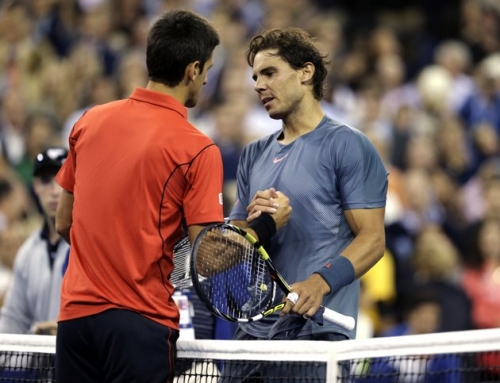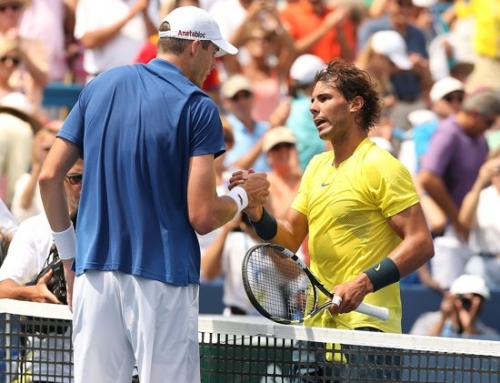 Every year, as we head to the end of the calendar year, American sports pundits lament at the lack of a playoff system for Division 1 football (American football). In the US, many large universities have football teams with somewhere between 80 and 100 players (though most don’t play and serve in backup roles). With so many universities spread out over so much area, and with the sport as violent as it is (which limits how often a team can play to once a week), it’s very difficult to determine the “best team”.
Every year, as we head to the end of the calendar year, American sports pundits lament at the lack of a playoff system for Division 1 football (American football). In the US, many large universities have football teams with somewhere between 80 and 100 players (though most don’t play and serve in backup roles). With so many universities spread out over so much area, and with the sport as violent as it is (which limits how often a team can play to once a week), it’s very difficult to determine the “best team”.
Americans love their championships. Some sports, like international cricket, seem to be about two countries that decide to meet and play a game or two, and the only real meaningful competition is the World Cup of cricket. In the US, most sports have a regular season where teams try to have a superior win-loss record and qualify for a championship in the so-called post season. Say there are 32 teams. A sport, like professional American football, has 12 of the teams make the playoffs in the post-season. Baseball, I believe, has 8 teams.
At the end of the playoffs, usually a form of single elimination play, the “best” team is given a trophy be it the Superbowl, the NBA finals, the Stanley Cup, or the World Series.
However, this is not how it’s done in college football. Throughout the year, computers, sports writers, and coaches all come up with ways to rank the football teams. Ultimately, some arcane formula is used to determine number 1 and number 2, and those 2 teams play off, invariably leaving out a potentially worthy team from winning a national championship.
Every year, sports writers can write their trusty articles, complaining, once again, that the BCS (which is used to rank college football teams) is a sham, and hoping for some oddity to occur (3 undefeated teams of a certain caliber) to make a mockery, and force college presidents to move to a playoff system. College presidents (for some reason, they are involved in matters athletic as well) refuse. The bowl system allows for 30 some-odd bowls of which 5 of them are the most prestigious. In the college presidents’ eyes, 30 winners is better than 1. 30 teams get to feel good about themselves.
But the craving to decide the very best seems ingrained in American sports, so this idea that 60 teams play in 30 bowls and create 30 winners is hardly satisfying. They’d rather jettison all but the 8 best teams, or 16 in a pinch. The notion is simple. Only the best matter. Ignore the fact that many teams are often thrilled to salvage a season even in the tiniest of bowls with the slimmest of viewers.
But sports pundits must have something to write about. It is their livelihood, so they trot this story out year after year, knowing that writing that extra article is what keeps them paid in the life they enjoy.
And so it happens with tennis too.
Tennis writers, much like the fans, like to focus on the best. They’d like to tell 900 of the active pro players to go home, because we don’t watch you. Never mind that these players, among the best in the world. sacrifice any chance at fame or wealth by toiling as a low-ranked player. Never mind that these players enjoy what they do for a living. Tennis writers, although they know better, have the same kind of blinders the average fans have. It’s only about the top 10 players to them.
And so, they complain about the tennis calendar. You can tell American sports writers of tennis. Oh sure, they “love” tennis, but they grew up watching sports that were on 6 months of the year. By the time the US Open rolls around to crowning its champ, they’re itching to watch college or pro football. And TV coverage heads that direction. This, despite the fact that the ATP tour continues to play tournaments until the end of November, nearly 3 months (or about a quarter of the season) after the US Open ends.
Sure, it’s nice to have 4 big tournaments a year, but these so-called tennis fans are so American centric that they want a year-end championship to determine the best. This is so part-and-parcel of team sports in the US that nothing will convince sports writers that it should be any other way.
A writer wrote, a few months ago, about the desire to spread out the four majors more evenly, and have a season leading up to each major. Thus, 2-3 months before the Aussie Open, 2-3 months before the French Open, 2-3 months before Wimbledon, and 2-3 months before the US Open, not realizing that tennis is primarily an outdoor sport and that each country has strong reasons to hold the major when they do.
The Australians choose late January so the middle weekend falls on Australia Day (admittedly, only a recently holiday), a 3-day weekend that allows more fans to watch. The French can’t go too much earlier otherwise it will be much chillier. The US Open has its middle Sunday on Labor Day. They could go later, and perhaps play in much cooler temperatures.
The latest complaint has been about Davis Cup.
Davis Cup is structured in an unusual way. The complaints lie in the size of the world and the crowded tennis calendar. If Davis Cup was expanded to 64 team, and that’s all there was all year, maybe people would love it more. But the fact of the matter is the world is huge, and as such, the logistics of planning every round of the Davis Cup is challenging, so teams are given some time to prepare.
In the main draw of Davis Cup, there are 16 teams. The first round is played the week after the Australian Open, the second, the week after Wimbledon, the semis are played the week after the US Open, and the finals played the week after the ATP World Tour Finals.
By its very placement, the top pros have little incentive to play. Federer routinely skips Davis Cup. Nadal realizes Spain has such a strong team that they have a chance to do well even without him. Andy Murray knows, without a strong number 2, or at least a very good doubles team, he’s expending a lot of effort often with little payoff. There are exceptions, of course. Players like Novak Djokovic or David Nalbandian or Robin Soderlng play because they believe in Davis Cup and the pride behind it.
And there lies the rub. The average American fan cares only about the best, so if the best won’t play, then why watch? At least, that’s how the theory goes.
And the best don’t generally play because the best are busy winning Slams, the most important part of tennis. And if they go deep in a Slam or win it, they are vulnerable to defeats in Davis Cup. Indeed, much of the appeal of Davis Cup is the David vs. Goliath aspects. Think of the recent win of India over Brazil in India. The Indians picked a hot and humid location to play. Their two best players have 3 digits by their rankings. Brazil has at least 2 good players in the top 100.
India’s 2 best players lost both the opening day matches, but pushed both opponents to 5 long sets. India still has a good doubles team despite the fact they can’t stand one another, and they won a point. Bellucci had to retire against Devvarman, and Bopanna used serve-and-volley to win his match. The Indian crowds were cheering wildly.
Now imagine hosting this in some neutral location. Only the richest Indians could afford to travel, and the cheering would not be nearly as passionate. This is one reason the World Cup works. Since it’s held so infrequently, fans will save to travel, but the fact of the matter is, most fans can’t really afford to go, and so it depends on a rabid local population that loves to watch great international soccer, regardless of the team. Would fans come out in droves to watch a tennis event like that? And the World Cup lasts a month, building up to a crescendo, capturing the world’s imagination.
Would there even be a month in the calendar you could do this in tennis? The best time would be maybe a month after the US Open.
The nice part of playing in a home country is the partisan crowds and the choice of surfaces and even the weather conditions. Colombia played the US in altitude. On paper, they didn’t have a team that could match up well against the US. They had the match on clay. They played in altitude. They tried to wring every advantage they could to pull an upset off. And they nearly had two points which would have forced a deciding fifth match. This upset almost came to be because the home country got to pick things to its advantage.
Davis Cup has generally been dominated by two countries: the US and Australia. In recent years, that has changed as more countries produce better players. Upsets occur because the best players aren’t in the best shape to play, so they skip, and small countries get a chance to win. It’s very much like those small bowls played in college football. Many of those teams will never contend for a national title. A bowl win, no matter how insignificant, is important to them.
There are Americans who watched a relegation match with Columbia and were scared that the US might not make it. They watched the heroics of Mardy Fish to win a key match and secure the tie. In a different scenario, this might be far less interesting. Imagine Columbia and the US playing in Australia. Would there be enough fans to watch? Would you get cowbells?
And what about the facilities? Would you eliminate all those tiny countries that don’t have a chance (you could run it like World Cup where those that qualify play more locally). World Cup crowns a champ every 4 years, but Davis Cup crowns a champ every year. Even Americans would lament the Superbowl once in 4 years. What would happen in between?
So, American writers get to complain about the Davis Cup format. Davis Cup might not gain the interest it does, but it is one of the better underdog team tournaments out there. We may seek the best in competition, but Davis Cup lets the small countries compete and lets them have a chance to go deep.
It’s not clear that changing the format would make tennis that much more popular, because tennis already has the Slams. Soccer doesn’t have much competing against it, so the World Cup is it.
In any case, as much as writers complain, their thoughts are rarely heard because unlike sports like college football with its plethora of writers, who show up on TV to complain, tennis writers barely register a blip. Complain all you like tennis sportswriters, because you’re more insignificant than the Davis Cup you complain about.




![[US Open Men’s Final] Can Djokovic beat Nadal in the finals?](https://www.essentialtennis.com/wp-content/uploads/2013/09/20130909djokovic-500x383.jpg)


![[French Open] The tactics of the Djokovic-Nadal semifinals](https://www.essentialtennis.com/wp-content/uploads/2013/06/20130607nole-500x383.jpg)